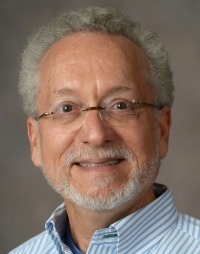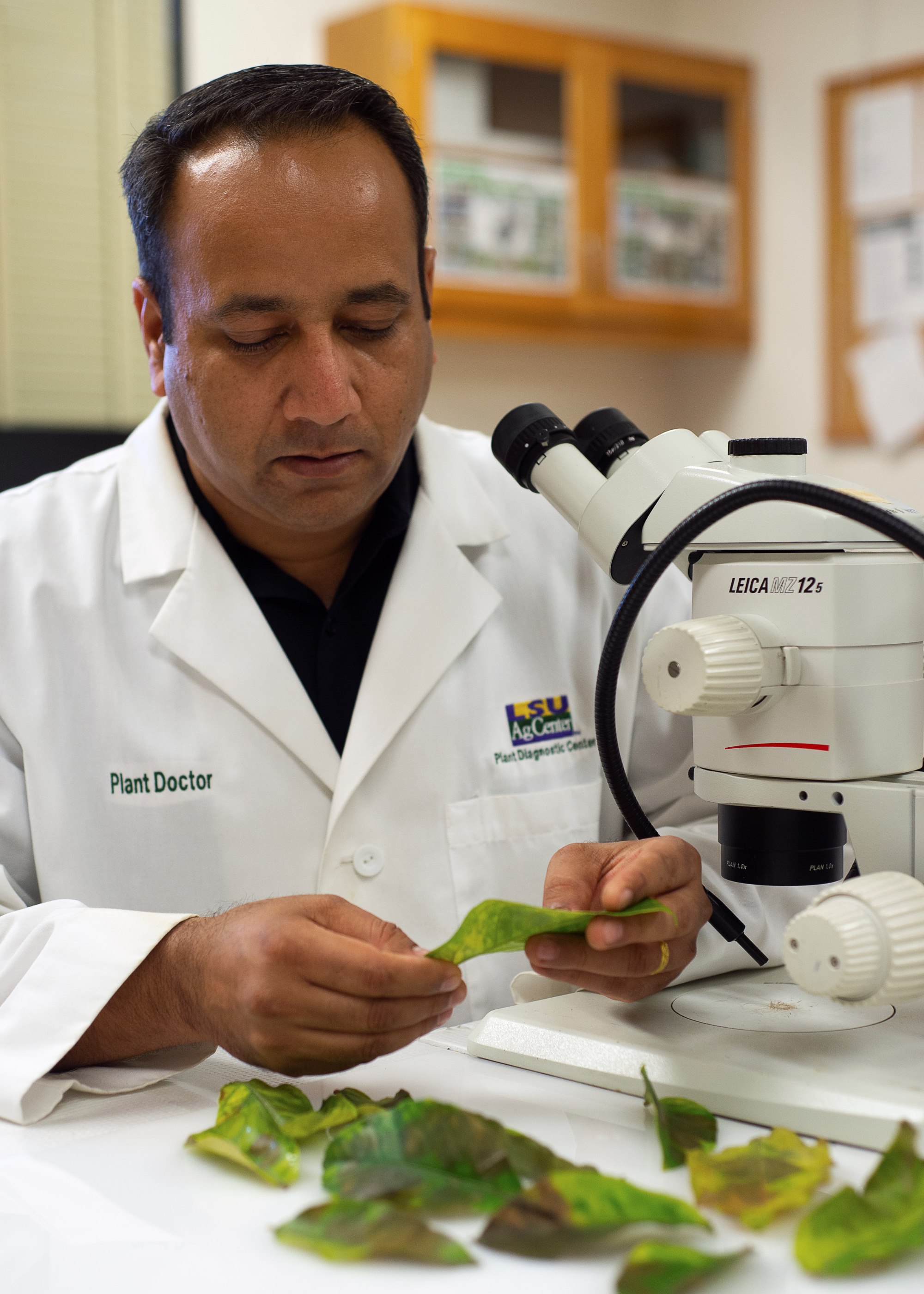About the Department of Plant Pathology and Crop Physiology
Welcome
The LSU Department of Plant Pathology and Crop Physiology is well-recognized nationally and internationally for applied and basic research on plant diseases of economically important crops and coastal plants, as well as work on plant abiotic stress. Louisiana’s warm, humid, sub-tropical environment is favorable for plant diseases and provides opportunities for mission-oriented research on corn, cotton, rice, soybeans, sugarcane, and sweet potatoes, as well as a number of horticultural crops.
Our graduate students have the opportunity to acquire cutting-edge research skills, as well as hands-on traditional diagnostics critical for the successful practice of plant pathology. Our students attend and present papers at regional, national and international meetings; conduct research in unique geographical areas and visit leading agricultural research facilities throughout the USA. Our active departmental graduate student association hosts visitors and plans workshops/activities designed to strengthen professional skills and knowledge of field and laboratory techniques.
Explore our website! You’ll see that LSU is the place to be for a high quality graduate education, distinguished faculty, innovative applied and basic research, dynamic extension and outreach, and active and award-winning graduate students.

Lawrence E. Datnoff
Professor and Department Head
LDatnoff@agcenter.lsu.edu
306 Life Sciences Building
Baton Rouge, LA 70803
225-578-1464
Mission
Since 1924, the overarching mission of the Department of Plant Pathology and Crop Physiology has been to advance and disseminate knowledge about the microorganisms and abiotic stresses that cause plant diseases and their management in agronomic and horticultural crops, as well as coastal plants, grown in Louisiana. Plant diseases and environmental stress seriously limit crop production in Louisiana. New diseases continue to appear because of changes in varieties and cultural practices and genetic shifts in existing populations of pathogens. In addition, new diseases are introduced into Louisiana from other states and countries.
Faculty have led efforts to improve the management of diseases caused by plant pathogens (fungi, bacteria, viruses and nematodes) and environmental stress (temperature extremes, excess moisture, mineral toxicities) through programs of research, extension and teaching related to Louisiana commodities that include corn, cotton, fruit crops, grain crops, ornamentals, rice, soybean, sugarcane, sweet potato, turfgrass, vegetable crops and coastal plants.
Donate to Ensure Excellence in Graduate Education
While the Department receives monetary support for core research/extension programs (LSU AgCenter) and its teaching program (LSU College of Agriculture), these funds are not sufficient to provide the resources to move our programs to the next level of performance. Private financial support is becoming a vital resource to enhance existing programs and begin new initiatives. Please, consider contributing to help support our programs.
You may help to support the Plant Pathology and Crop Physiology Department by donating to one of the below listed funds:
This fund provides support to bring in expert professionals from academia and industry. Since 2009, the Graduate Student Association of the Department of Plant Pathology & Crop Physiology has had the opportunity to select a guest speaker for our spring departmental seminar series. All students have an opportunity to nominate possible speakers, and the graduate students make their selection based on their discussions of the candidate’s academic and professional experience.
The program was initiated to give graduate students an opportunity to interact with professionals outside of our department, to broaden their educational experiences, broaden their research knowledge, develop professional relationships and provide them with a personal network for potential job opportunities. This activity has been very successful, but funding for this program is limited.
While the Department receives monetary support for core research/extension/teaching
programs, these funds alone are not sufficient to provide the resources to move our
programs to the next level of performance. This fund will provide additional support
to help promote and maintain excellence in diverse ways.
Funds will be used flexibly to support graduate student travel to professional meetings and special technical training seminars; supplement graduate student assistantships; promote interactions among the faculty, staff and students at LSU, as well as with other universities and institutions; develop brochures and web-based information; and offset the purchase of needed equipment.
Established in 1965 by two of Dr. Edgerton’s sisters, this fund provides awards for outstanding performances by Plant Pathology and Crop Physiology graduate students who are in their last year of their M. S. or Ph. D. degree program. A student may be chosen from each discipline to receive the award, and all faculty members participate in the selection process.
The award consists of 1) recognition of outstanding performance, 2) an appropriate certificate, and 3) a monetary reward. Since 1999, 12 students have won the Edgerton Award and it has become a truly prestigious award.
This endowed fellowship fund was established to support graduate student education in the Department of Plant Pathology & Crop Physiology in honor and memory of Dr. Weston J. Martin.
The Martin Fellowship allows the department to supplement existing resources and compete with other Universities for applicants with outstanding credentials to the graduate program. The endowment currently has $55,525.00, and we would like to raise it to $100,000.
Dr. Rush was a rice pathologist who trained and educated over 27 M.S. and Ph.D. students, so that they may obtain both basic and applied understanding of plant pathology and agriculture. Many of his students went on to fill critical positions in academia, industry and other agriculture enterprises in the U.S. and around the world. To continue this great tradition and honor Dr. Rush’s memory, the M. C. “Chuck” Rush Plant Pathology Teaching Laboratory Fund has been established by his family.
The objective of the fund will be to remodel and equip the plant pathology teaching laboratory into a state-of-the-art facility to further and better enhance student’s fundamental and hands-on learning experiences. We are asking for donations to help make this dream come true.
Dr. Don Ferrin, was an Extension Plant Pathologist with commodity responsibilities for all horticultural crops in Louisiana. Dr. Ferrin excelled in the diagnostics and delivery of plant disease management information. He also deeply valued his interactions with graduate students.
This fund was created in honor and memory of Dr. Ferrin by his family to support primarily graduate students in the following areas: assistantships, travel to meetings, specialized training and other academic/professional pursuits.
Donations can be made by accessing the LSU Foundation site then selecting the desired fund you wish to donate to or by sending a personal check made out to the LSU Foundation with a letter stating which fund you would like to donate to and then mail to:
Department of Plant Pathology and Crop Physiology
302 Life Sciences Building
LSU Campus
Baton Rouge, LA 70803
